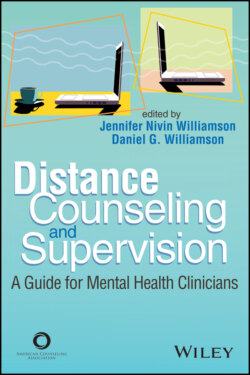Читать книгу Distance Counseling and Supervision - Группа авторов - Страница 11
Competency
ОглавлениеIn many situations, counselors are responsible for identifying and demonstrating competency when determining their scope of practice. There are, however, specific laws or regulations for determining minimum standards. Some state licensure boards have identified minimum training standards through continuing education credits or university training, whereas other boards have not clearly articulated expectations. It has been a challenge for regulatory entities to stay current with the rapid evolution of technology and technological practices. It is clear in all situations that counselors must always function within their areas of competence and be able to provide evidence regarding their competence and adequate training. This is especially challenging as technology is constantly changing, and best practices in technology-assisted mental health services are in their infancy. ACA (2014) notes that “counselors who engage in the use of distance counseling, technology, and/or social media develop knowledge and skills regarding related technical, ethical, and legal considerations (e.g., special certifications, additional course work)” (Standard H.1.a.).
In addition, counselors must make clients and supervisees aware of the training, limitations, and protections offered by the counselor or supervisor (American Association for Marriage and Family Therapy, 2015). The Association of Marital and Family Therapy Regulatory Boards (AMFTRB; 2016) identified a minimum of 15 hours of initial training, including the appropriateness of teletherapy, teletherapy theory and practice, modes of delivery, legal/ethical issues, handling online emergencies, best practices, and informed consent. In addition, it requires five continuing education hours every 5 years. NBCC offers a nationally recognized credential, the board certified-telemental health provider (BC-TMH), who might be useful in training and the demonstration of skills. This provides counselors an opportunity to demonstrate formal training or skill attainment as a telemental health provider (Center for Credentialing and Education, 2020).
